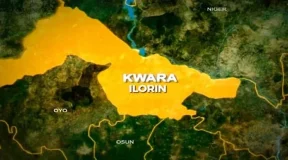COVID-19, no doubt, took the world unaware. This followed chains of reactionary drives. After months of uncertainties, the International Association of Drilling Contractors, IADC Nigeria, is gradually resetting its economic and operational bearings.
On Friday, September 25, the association had its solution searching webinar conference. Members and its international affiliates were in attendance. The association leadership offered illuminating insight into the subsector’s post-pandemic business outlook
In his opening remarks, the Chapter’s Chairman, Chuks Enwereji, posited an assuring situation. He said despite the “catastrophic effects of the pandemic in the energy sector, the industry would rebound sooner than expected.”
However, despite Enwereji’s positive projections, he noted that the pandemic has caused the most abrupt recession in the industry.
According to him, the pandemic has orchestrated marginal drop in growth. It has resulting to job and revenue losses. Consequently, demands for oil and gas as a result of global lockdown have depleted. This resulted to lower oil price, disrupted supply chains and compulsory quarantine procedures for off-shores employees.
“These disruptions have led to significant reduction in capital spending for most operators and we have seen a number of contract terminations and suspensions since the onset of the Covid19 pandemic. There has been a wave of bankruptcies in the industry as most companies are unable to cope,” he said.
IADC INCREASE IN SIZE
At the local scene, Enwereji rolled out statistics indicating how the COVID-19 has profoundly affected the industry. “Rig counts depleted from 37 in February to 25 in March. By end of July 2020, there were only 11 active rigs amid a whopping 67 rigs in-country. As at today, September 25th, 2020 a couple of more rigs have gone back to work. The growth continues. We now have 16 active rigs across Land, Swamp and Shallow Offshore.”
Despite what seems gloomy picture, the association has increased in numerical strength from 38 in 2019 to 42 in 2020. This represents an increase by 11 percent.”
He added that “Our hope is further validated with the recently concluded 2020 Marginal Fields Bid Round. Department of Petroleum Resources (DPR) coordinated the bid. A total of 57 fields located on Land, Swamp and Shallow Offshore were offered.”
Enwereji further presented a brighter indication of increase in deep water, land, swamp, shallow water space. He harped on the successful Marginal Fields Bid Round as a positive indicator. He also assured the certainty of the passage of the industry bill by the National Assembly would increase operational activities.
“As oil prices rally above the $40 per barrel mark, and the reopening of economies around the world, we are beginning to see some rigs go back to work. If oil price goes to $50 per barrel, as has been the case in the past, we are consciously optimistic that activities will increase,” he assures.
Nonetheless, to address the short and long-term effects of the pandemic, Enwereji proposes multi-phased approaches. That includes the adoption of health social and economic methods. According to Enwereji, that will not only control and mitigate the effects of the pandemic. It will re-activate the business bearings and rebuild in sustainable and inclusive ways.
KNOWLEDGE SHARING
As an association, Enwereji assured IADC members of unending knowledge sharing and updates as enablers to square up and overcome COVID-19 obstacles. He also urged members to be conscious of cyber security awareness.
To that effect, the chairman said “In providing a platform that encourages participation, information sharing, and collaboration, we are launching a new website today.It is a website that will maximize members’ benefits and increase online access to resources, rig count trends, download of materials, regulatory guidelines, alerts (both safety & security) and news updates.”
“It is my honour and privilege as the Chairman of IADC Nigeria Chapter to welcome you all and introduce our new official website; www.iadcnigeria.org. This website will help us to better relationships with our partners, regulatory agencies, sister organizations and a go to resource for members in good standing.” he said.

AUGUST TECHNICAL SESSION
Earlier, in an all-inclusive submission at an August 19,2020 HSE Awards & Technical session webinar organized by IADC Nigeria Chapter, global key stakeholders and players in the drilling subsector equally indicated full resumption of drilling operational activities sooner than expected.
But given that a significant number of countries remain far from achieving a sustained and significant flattening of the curve, the IADC Nigeria Chapter players were cautious on timing specifics.
In terms of health, the dynamics of contagion as influenced by acute disregard to laid down rules was the centre piece of Mrs.Abioye Omoseni presentation. The association’s Treasurer cautioned managements not to let down their guard on pandemic protocol as works resumes.
SAFETY
Omoseni made a case for human interaction at workplace, “Management must promote the best of human interactions and pay attention to details. For instance, it is possible for a victim to recover and resume back at work and later test positive. Therefore, management must put up a robust interactive protocol including immediate report of noticeable mental imbalance and ensure adherence to all level of compliance stipulated by Nigeria Centre for Disease Control, NCDC,” she said.
On his part, the guest speaker, Timothy Cox, Partner, West Africa, Control Risks, agreed with Enwereji on all issues. Nonetheless security and recovery issues.
The webinar, themed: “Business Continuity Risks to Nigerian Drilling Contractors and Survival Post Covid-19 had Alex Illah ,IADC Nigeria Chapter Chairman Board of Trustees, Hisham Zebian, IADC’s Vice President, Eastern Hemisphere in attendance. Chief Executives of International Oil Companies (IOCs), National Oil Companies (NOCs), representatives of Nigeria Petroleum Exchange (NIPEX), Department of Petroleum Resources (DPR) and National Content Development and Monitoring Board (NCDMB) were in attendance and acknowledged.
It would be recalled that in March 2020, Nigeria and indeed, other governments of the world, imposed movement restrictions. There was also a lockdown of other economies as part measures to fight the spread of coronavirus.
The COVID-19 unleashed serious negative impact on supply-side, foreign travel, manufacturing, and investment opportunities. There have been reported losses of income and fall in demands especially in the value chain of drilling.







